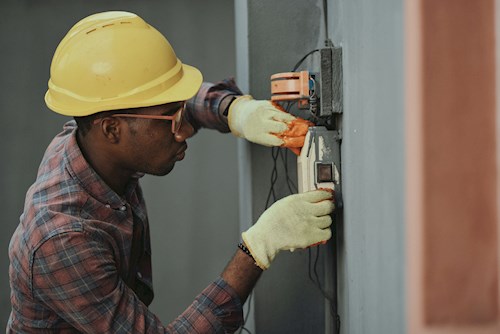
The original IRA contained a variety of rules and incentives around prevailing wage and apprenticeship and domestic content requirements. Renewable energy projects that started construction before December 31, 2025 are subject to those original rules.
Renewable energy projects that began construction on or after January 1, 2026 are subject to the new Prohibited Foreign Entities of Concern (PFEOC or PFE) requirements.

Applicability
Under the IRA, the prevailing wage and apprenticeship provisions apply (in various ways) to the:
In addition, the Inflation Reduction Act’s prevailing wage provisions apply to the:
Prevailing Wage and Apprenticeship
Prevailing Wages - Project must ensure all laborers and mechanics are paid the applicable prevailing wage, including fringe benefits, for all hours performing construction, and in some cases alteration or repair, on the site of the work of a qualified facility.
Prevailing wage is the combination of the basic hourly wage rate and any fringe benefits rate, paid to workers in a specific classification of laborer or mechanic in the area where construction, alteration, or repair is performed, as determined by the Secretary of Labor. The Wage and Hour Division posts labor classifications and their prevailing wage rates in wage determinations on sam.gov. Review our guide to help you navigate sam.gov. Waivers for this requirement are possible if complying would increase facility's costs by 25% or more or where produced are not produced in th U.S. in sufficient quality or quantity.
See the final IRS guidelines on prevailing wage for IRA credits. To learn more, check out the Lawyer's For Good Prevailing Wage Fact Sheet and see more information about Prevailing Wages from the Department of Labor website and Department of Labor FAQs.
Apprenticeship requirements include three components:
Read more about apprenticeship requirements.
In July 2025 Congress passed H.R.1 ("The Big Beautiful Bill") that creates new restrictions for entities (including suppliers) with connections to covered nations (China, Iran, North Korea and Russia). These rules apply to project ownership as well as equipment suppliers. And the rules are still evolving--as of this post the IRS has not issued final guidance.
Lawyers for Good Government (L4GG) has done a white paper and two webinars on the PFE requirements. While L4GG is focused on tax-exempt entities, the law they discuss here applies equally to for-profit entities and their materials are available for free. The resources are:
The new requirements are significantly different than prior requirements so entities should review these materials and other resources carefully to ensure that projects qualify for the remaining tax credits.
The Domestic Content Bonus Credits are based on the existing Buy America Requirements. The aim is to encourage projects that benefit U.S. Manufacturing.
Businesses and tax-exempt entities can earn a 10% bonus on renewable energy credits if projects meet the Domestic Content requirements.
Beginning in 2024 Elective Pay renewable energy projects over 1MW(ac) that do not comply with domestic content requirements will receive reduced credits.
To be eligible the project must meet three additional requirements: 1) the Steel or Iron Requirement, 2) the Manufactured Products Requirement, and 3) a certification requirement. Read more information from the IRS guidance. See also this article from a Lawyers for Good partner.
In December 2023, the IRS published a memo on domestic content penalties. The memo requests comments on several relevant questions by February 26, 2024, and provides a method for claiming a waiver for projects that start construction in 2024. To claim a waiver, one must attest that it reviewed the requirements for increased cost exception and non-availability exception and determined that the installation qualifies for one of the exceptions. The attestation must be signed by a person with legal authority for federal tax matters.